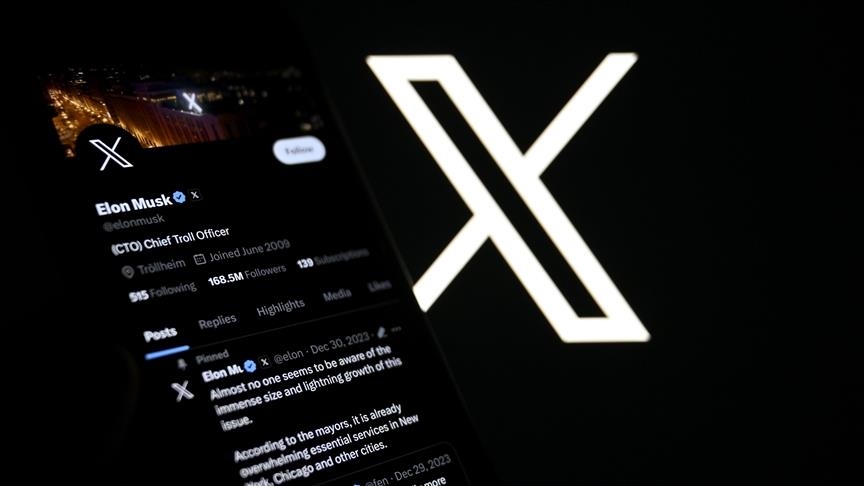OPINION - Elon Musk, Brazil, and the battle for digital sovereignty
Even before acquiring Twitter, Musk admitted that the platform could be manipulated by bot accounts, with real human interaction representing a small fraction of total engagement

- Despite Musk's self-proclaimed defense of free speech, he directly targeted and threatened a Brazilian Supreme Court judge, criticizing the judge for being unelected
- Elon Musk's business activities in Brazil, cloaked in the rhetoric of defending free expression, are driven by far more than democratic ideals
- As Brazil grapples with internal unrest and legal challenges to multinational corporations like X and Starlink, the struggle for control over digital sovereignty becomes even more critical
The author is a researcher at TRT World Research Center based in Istanbul, Türkiye.
ISTANBUL
Brazil, South America's largest economy, has been the focus of investor interest due to its potential in technology and innovation. The country is an important market for Elon Musk, who is the world's richest person and future first trillionaire, due to its developing technology sector and vast resources. Despite the potential for fruitful cooperation, recent news reports have highlighted the ongoing legal disputes between the two parties.
This issue, often viewed as a recent example of the ongoing struggle for power between sovereign states and tech giants, touches on various concepts like sovereignty, the rule of law, infringement on national regulations, political manipulation, freedom of expression, and censorship. However, mainstream Western news organizations frequently downplay the actions of multinational corporations and often fall short in providing their audiences with accurate, objective, and comprehensive coverage of related news.
What happened before the ban?
Musk's platform X operated in Brazil with a legal representative and office in compliance with local laws. However, after a court ordered the shutdown of several far-right accounts for spreading false information, Musk responded by closing the X office and withdrawing the representative, citing threats of arrest. This led to the platform being blocked for not meeting legal obligations on time. In response, Brazilian authorities froze the financial accounts of X and Musk's satellite provider, Starlink, and moved to collect fines from these accounts.
Despite Musk's self-proclaimed defense of free speech, he directly targeted and threatened a Brazilian Supreme Court judge, criticizing the judge for being unelected. Musk's recent comments aimed at the British prime minister and government officials in other countries further highlight his inconsistent stance on democratic processes.
Unchecked platforms and false pretense of free speech
Framing this issue solely as a matter of freedom of expression sets the stage for a misguided discussion from the start. While the Internet offers tremendous benefits for the production and dissemination of information, it also provides the same opportunities for spreading lies, disinformation, and harmful content. Conducting terrorist propaganda and promoting hate speech, racism, and radicalization is easier, more widespread, and less costly online than in the physical world. Allowing virtual platforms to operate as if they are above the law, under the vague guise of free speech, only exacerbates the problem.
As unchecked platforms threaten global economies, social peace, and democratic processes, Elon Musk trivializes these concerns by calling X (formerly Twitter) the "most accurate news source." Even before acquiring Twitter, Musk admitted that the platform could be manipulated by bot accounts, with real human interaction representing a small fraction of total engagement. By introducing a paid membership system that grants access to the previously verified blue tick, Musk has further undermined the platform’s integrity.
Responsibility of traditional media
A further problem is that the Western media is reporting the issue as if it were a personal dispute between a judge and the wealthiest man on earth. Unfortunately, the result of this reductionist language is that the discussion is being turned into a tabloid by a shift in its focus. Demands such as the rule of law, human rights, and the maintenance of public order, which are presented as indispensable core values for Western imperial powers and their extensions, can instantly become unimportant details when it comes to other geographies.
The narrative is oversimplified as a clash between Supreme Court Justice Alexandre de Moraes and Elon Musk, painting Musk as a staunch defender of free speech. This misleading approach hinders the search for a logical and balanced solution, contributing to the deadlock and polarization surrounding digital platform regulation.
Digital sovereignty is existential
Elon Musk's eagerness to expand his operations to Brazil until a few years ago was not due to his concern for people's freedom of expression or the country's healthy democratic functioning and public opinion. The country's rising value, strategic geopolitical characteristics, rich resources, and population make it an important market for technology investment, especially for tech tycoons. Moreover, a country destabilized by internal unrest and political turmoil creates a highly favorable environment for securing certain economic advantages. The underlying business interests must not be overlooked, as Elon Musk's business ventures in Brazil clearly involve much more than a commitment to a so-called sacrosanctity of the freedom of speech.
In the ongoing tug-of-war between sovereign states and tech giants, it is crucial to recognize that the narrative of free speech often serves as a convenient cover for deeper economic ambitions. As Brazil grapples with internal unrest and legal challenges to multinational corporations like X and Starlink, the struggle for control over digital sovereignty becomes even more critical. In this context, Brazil's response to Musk's actions reflects a larger global conversation on holding powerful tech entities accountable—one that will shape the future balance of power in the digital age.
*Opinions expressed in this article are the author’s own and do not necessarily reflect Anadolu's editorial policy.
Anadolu Agency website contains only a portion of the news stories offered to subscribers in the AA News Broadcasting System (HAS), and in summarized form. Please contact us for subscription options.







